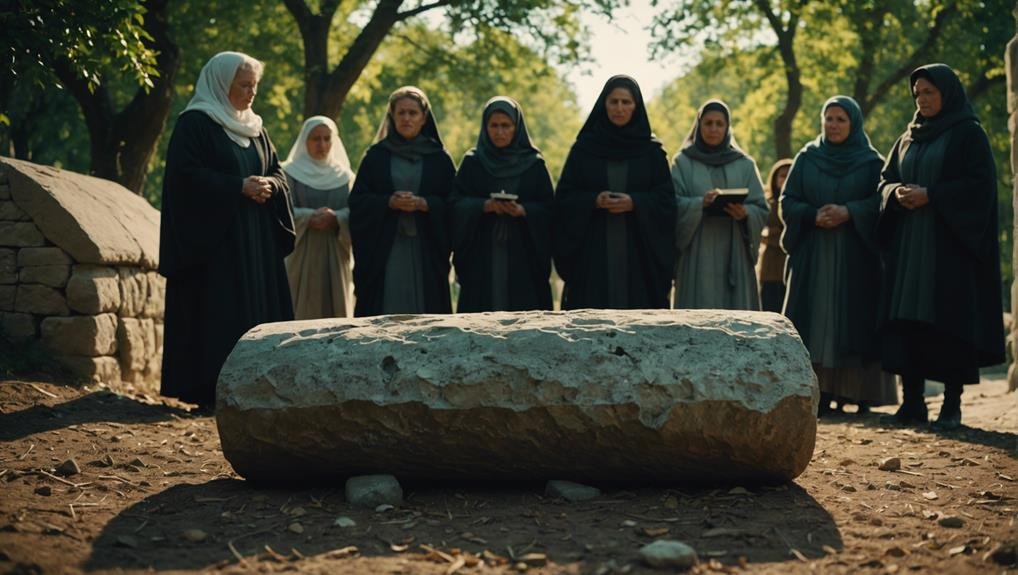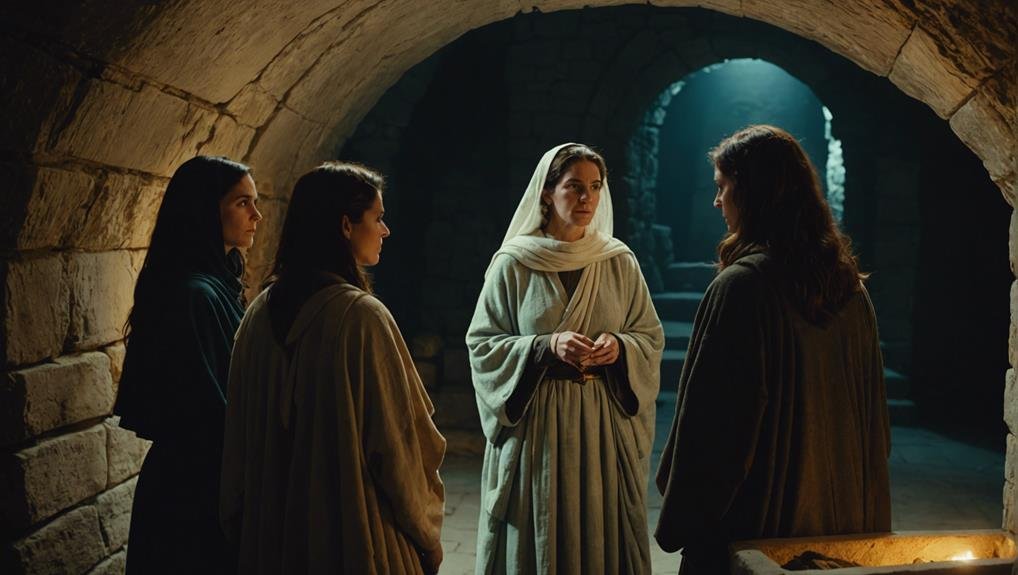As you reflect on Resurrection Sunday and the significance of the empty tomb, consider the profound impact this event has had on Christian faith throughout history.
The empty tomb symbolizes Jesus’ victory over death and serves as a powerful witness to His divine identity and the hope He offers to believers. As you ponder the implications of this miraculous event, you may find yourself drawn into a deeper understanding of the core beliefs that underpin the Christian faith.
Key Takeaways
- The empty tomb symbolizes Jesus’ victory over death and sin.
- Resurrection Sunday celebrates Jesus’ triumph over the grave.
- The empty tomb on Resurrection Sunday signifies hope and renewal.
- It is a cornerstone of the Christian faith, affirming Jesus’ divinity.
- The empty tomb solidifies belief in Jesus’ resurrection and eternal life.
Biblical Accounts of the Empty Tomb

The biblical accounts of the empty tomb vary in detail but collectively affirm the pivotal role of women in discovering Jesus’ resurrection. Mary Magdalene features prominently across the Gospels in the empty tomb narrative.
In Mark 16, along with Mary, the mother of James and Salome, she’s instructed by a young man in a white robe at the empty tomb to inform the disciples of Jesus’ resurrection.
Matthew 28 tells of Mary Magdalene and the other Mary encountering an angel who delivers the news of Jesus’ resurrection. Luke 24 describes women finding the tomb empty, encountering angelic beings, and reporting the resurrection to the skeptical disciples.
John 20 focuses on Mary Magdalene’s discovery of the empty tomb, her encounter with Jesus after the resurrection, and her initial failure to recognize him.
Throughout these accounts, Mary Magdalene emerges as a key figure in the pivotal event of Jesus’ resurrection, highlighting the significant role of women in the early Christian narrative.
Significance of the Empty Tomb
Consider the profound impact of the empty tomb on Christian faith and theology. The empty tomb of Jesus isn’t just a historical event but a pivotal moment that solidifies his divinity and fulfills longstanding prophecies.
According to the Gospel accounts, this tomb, found empty, confirms the reality of Jesus’ resurrection and is the foundation of Christian belief. Understanding the significance of the empty tomb is paramount for every believer.
It serves as a cornerstone of faith, symbolizing the triumph over sin and death. Christians find hope, assurance, and the promise of eternal life in the tomb’s emptiness. Responding to the reality of the empty tomb requires faith, obedience, and a commitment to sharing the good news.
Through the empty tomb, believers are called to live out their faith, spread the message of salvation, and embody the victory that Jesus achieved over death. The empty tomb isn’t just an event of the past; it’s a present reality that continues to shape the lives of Christians worldwide.
The Women at the Tomb

Exploring the pivotal role of the women at the tomb sheds light on the initial moments following Jesus’ resurrection. In the Gospel of Mark, Mary Magdalene, Mary the mother of James, and Salome went to the tomb early on the first day of the week to anoint Jesus’ body with spices.
Upon arrival, they were surprised to find the stone already rolled away, defying their concerns about who’d move it.
This discovery was a stark contrast to the hands of sinful men who crucified Jesus. Inside the tomb, a young man in a white robe informed the women about Jesus’ resurrection and instructed them to share the news with the disciples, including Peter.
This encounter marked the beginning of the proclamation of Jesus’ resurrection, emphasizing these women’s significant role in witnessing and spreading the news of the empty tomb.
Angels Announce Resurrection
As angels appeared at the empty tomb, they announced Jesus’ resurrection to the women present, marking a profound moment in the Easter narrative. These celestial beings conveyed the awe-inspiring news that Jesus had risen, affirming the fulfillment of ancient prophecies.
Their presence at the empty tomb added a divine touch to the miraculous event, emphasizing the significance of Jesus’ victory over death.
The angels’ message resonated with the women, who were instructed to share this extraordinary revelation with the disciples. This pivotal moment, where heavenly messengers proclaimed the resurrection at the site where Jesus had been laid, solidified the foundation of the Christian faith.
The assurance provided by the angels ignited a flame of hope and belief in the hearts of those who witnessed this extraordinary event. The announcement of Jesus’ resurrection by the angels at the empty tomb laid the groundwork for the transformative impact of this miraculous occurrence.
Peter’s Visit to the Tomb

As detailed in the Gospel accounts, Peter made his way to investigate upon hearing reports of the empty tomb. It was the first day after the Sabbath, and the news of the stone rolling away stirred a sense of urgency within him.
As he hurried to the tomb, Peter remembered Jesus’ words about rising again on the third day. Arriving at the site, he found the stone moved, revealing the empty tomb.
In the Gospel of John, Peter, accompanied by another disciple, raced to the tomb after Mary Magdalene’s startling discovery. Together, they witnessed the linen cloths and the napkin lying in separate places, a puzzling sight that added to the mystery of the empty tomb.
Despite the variations in the Gospel accounts regarding Peter’s involvement, one thing remains clear—Peter’s visit to the tomb played an important role in the unfolding events of Resurrection Sunday.
The symbolism of the Empty Tomb
Peter’s visit to the tomb reveals deep symbolism in the significance of the empty tomb. Early on the first day, he entered the tomb and saw it empty. Two men stood there and told him Jesus had risen, fulfilling the prophecy.
The empty tomb symbolism goes beyond the physical absence of Jesus’ body; it represents the victory over death and the promise of eternal life. It is a powerful symbol of hope and faith, showing that death isn’t the end but the beginning.
The empty tomb highlights the miraculous nature of Jesus’ resurrection, emphasizing his triumph over sin and the grave. It’s a core belief in Christianity, signifying that Jesus is the Son of God and that through him, believers can have everlasting life. The empty tomb is a beacon of light, illuminating the path to salvation and eternal joy.
Victory Over Death

The victory over death symbolized by the on Resurrection Sunday is a foundational Christian belief. The empty tomb stands as a testament to Jesus’ triumph over death and the grave. It is a profound reminder of the power of resurrection and the hope it brings to believers.
Through the resurrection from the empty tomb, Jesus conquered sin and mortality, offering assurance of eternal life to all who believe in Him.
The empty tomb on Easter Sunday declares Jesus’s ultimate victory over death. It signifies a historical event and a spiritual truth that resonates deeply with Christians worldwide. The empty tomb is a tangible representation of the defeat of death and a promise of new life for those who follow Jesus.
Ultimately, the resurrection from the empty tomb is a powerful demonstration of victory over death, offering believers hope and assurance of eternal salvation.
Hope and Despair Contrast
Discovering the Resurrection Sunday vividly contrasts hope with despair. The sight of the empty tomb brought a glimmer of hope to the disciples, who were engulfed in despair following Jesus’ crucifixion.
Despite initial despair, the women’s emotions transformed into hope as they encountered the empty tomb on that significant Sunday. Resurrection Sunday is a powerful symbol of hope triumphing over despair through the tomb’s emptiness.
The mere existence of the empty tomb on Resurrection Sunday served as a beacon of hope, turning the disciples’ profound despair into unwavering faith and belief in Jesus’ resurrection. The tomb’s emptiness not only dispelled despair but also ignited a flame of hope that continues to burn brightly in the hearts of believers.
The contrast between hope and despair is starkly evident in the profound significance of the empty tomb on Resurrection Sunday.
Cornerstone of Christian Faith

Understanding the empty tomb as the cornerstone of the Christian faith is essential for anchoring one’s beliefs in Jesus’ divinity and victory over sin and death.
The empty tomb isn’t just a symbolic tale but a foundational event in Christian theology. It confirms Jesus’ divine nature and fulfills ancient prophecies. Gospel accounts meticulously detail the discovery of the empty tomb, underscoring its historical reality and significance.
This historical truth is a bedrock for Christian belief, offering assurance of victory over sin and death. Recognizing the empty tomb as a pivotal moment in history allows you to find hope and strength in its promise.
Embracing the empty tomb as a core tenet of faith empowers believers to face life’s challenges confidently, knowing that victory has been secured over the forces of darkness through Jesus.
Resurrection Sunday Celebration
Celebrate Resurrection Sunday as a time to honor the triumph of Jesus’ resurrection from the dead. This day, also known as Easter Sunday, holds tremendous significance in the Christian faith as it commemorates Jesus Christ’s conquering death and rising from the grave.
The resurrection symbolizes hope, renewal, and the promise of eternal life. To mark this momentous occasion, churches around the world hold special services, including sunrise gatherings.
The empty tomb is a powerful reminder of the victory of light over darkness, life over death, and hope over despair. By celebrating Resurrection Sunday, Christians reiterate their belief in the core tenet of their faith – that Jesus Christ overcame sin and death, offering salvation to all who believe in Him.
Embrace this day with joy and gratitude, knowing that through Jesus’ resurrection, we have the ultimate promise of redemption and new life.
Conclusion
As you reflect on the empty tomb on Resurrection Sunday, remember Jesus’s incredible victory over death. Let the hope and joy of this miraculous event fill your heart with gratitude and faith.
Celebrate the foundation of your Christian belief with renewed dedication and praise. The empty tomb is a powerful symbol of life, love, and eternal promise. Embrace the significance of this day and rejoice in the victory of Jesus’ resurrection.

